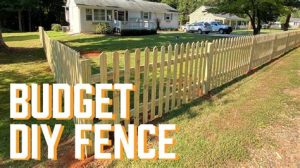Learn how to navigate local regulations and permit requirements for smooth approval processes with expert tips on consulting zoning authorities and preparing documentation.Building a fence can enhance your property’s privacy, security, and aesthetic appeal, but before you start digging, it’s crucial to understand the permit process. Many homeowners overlook the importance of properly navigating local regulations and permit requirements, which can lead to costly fines or the need to remove an unauthorized fence. In this blog post, we’ll explore essential considerations that every homeowner should keep in mind before embarking on their fencing project. From understanding local regulations and researching specific permit requirements to consulting with zoning authorities and preparing the necessary documentation, we’ll guide you through the entire approval process. With the right knowledge, you can ensure that your fencing project is not only beautiful but compliant with your local laws. Let’s dive into the key aspects of securing a fence permit and building with confidence.
Understanding Local Regulations
When planning to build a fence, understanding local regulations is crucial to ensure compliance and avoid any potential legal issues. Each municipality may have its own rules regarding fence construction, which can include height restrictions, materials used, and placement within property lines. It is essential to familiarize yourself with these regulations before starting your project.
Many areas require homeowners to obtain a permit before erecting a fence. This process is aimed at maintaining community standards and ensuring safety. To begin, check with your local government or building department to find the specific requirements and restrictions for your area. Often, these details can also be found on the municipality’s website.
In addition to contacting local authorities, it’s wise to consult your neighborhood’s Homeowners Association (HOA) guidelines, if applicable. HOAs may have stricter rules than city regulations, which could influence the design and dimensions of your intended fence. Being proactive in understanding these local regulations can save you time and money in the long run, enabling a smooth construction process.
Researching Permit Requirements
When planning to install a fence, one of the most crucial steps is researching permit requirements. Each locality has its own rules, and understanding them can save you time, money, and potential headaches down the line. The first thing you should do is check with your local government office or municipal website to find out if a permit is needed for your specific fence project.
Generally, you may need to consider several factors when researching permit requirements.
- Height Restrictions: Many areas have regulations on how tall your fence can be.
- Material Guidelines: Certain materials may be prohibited or have specific standards you must adhere to.
- Property Lines: Knowing your property boundaries is vital to ensure you’re compliant with local laws.
It’s also advisable to consult with your zoning authorities to clarify any ambiguities in the regulations. This can prevent you from making costly mistakes, such as having to remove a fence that doesn’t comply with zoning laws. Always err on the side of caution and ensure all necessary permits are acquired before proceeding with the installation of your fence.
Consulting with Zoning Authorities
When planning to install a fence, it’s crucial to consult with zoning authorities in your locality. Zoning laws can vary significantly from one area to another, and understanding these regulations will help you avoid costly mistakes.
Begin by reaching out to your local zoning office or planning department. They can provide you with information regarding setback requirements, which dictate how far your fence must be from property lines, as well as guidelines on height restrictions and permitted materials.
It’s also advisable to inquire about any special permits that may be required, especially if you live in an area with specific community standards or historical designations.
Preparing Documentation for Application
When it comes to applying for a fence permit, preparing documentation is a critical step that can significantly impact the success of your application. To begin with, you’ll want to gather all necessary documents that reflect your proposed project accurately. This ensures that zoning authorities can easily review your application and make informed decisions.
- Site plan indicating the proposed location and dimensions of the fence
- Photographs of the property and existing structures
- Detailed specifications of the materials to be used
- A statement explaining the purpose of the fence
Additionally, it’s vital to check your local regulations to determine if any specific forms or additional information are required as part of your application. Providing comprehensive and well-organized documentation not only expedites the review process, but also increases the likelihood that your permit will be approved without unnecessary delays.
Navigating the Approval Process
When it comes to building a fence, navigating the approval process can be one of the most critical yet challenging steps. Many homeowners don’t realize that erecting a fence often requires compliance with local laws and obtaining permits. Here are some essential tips to help you through this process.
First, it’s important to familiarize yourself with your local regulations and the specific procedures outlined by your municipality. This may include checking your area’s zoning laws, which dictate aspects such as height and design standards. Often, certain types of fencing materials may also require specific considerations, particularly in residential neighborhoods.
Once you have a clear understanding of the regulations, the next step is to submit your permit application. Make sure to gather all necessary documents, including site plans, specifications, and photographs if required. Some areas may even ask for neighbor notifications, to ensure that those living near your property are informed about your fencing plans.
After submission, you will have to wait for the authorities to review your application. Be prepared to answer any questions or provide additional information if needed. It is also wise to be patient, as the review process can take time depending on your local government’s workload.
Once your application is approved, make sure to keep your permit on site during the construction of the fence. Finally, schedule any necessary inspections to ensure that the work is compliant with all local building codes. Following these steps will help ensure that your fence project goes smoothly and that it adheres to all necessary regulations.
Frequently Asked Questions
What is a fence permit?
A fence permit is an official authorization from a local government that allows you to construct a fence on your property, ensuring that the planned structure complies with local zoning laws and regulations.
Why do I need a permit to build a fence?
You need a permit to build a fence to ensure that the construction adheres to local building codes, maintains property line boundaries, and upholds safety standards.
How do I find out if I need a fence permit?
To find out if you need a fence permit, check with your local zoning office or building department, as regulations can vary widely based on location.
What are the common requirements for obtaining a fence permit?
Common requirements for obtaining a fence permit may include submitting a site plan, adhering to specific height and material regulations, and ensuring setbacks from property lines.
What can happen if I build a fence without a permit?
Building a fence without a permit can result in legal repercussions, including fines, orders to remove the fence, or assessments of property taxes based on unauthorized improvements.
Can I appeal a denied fence permit?
Yes, if your fence permit application is denied, you can typically appeal the decision by following your local government’s specified appeal process.
Are there different types of fence permits?
Yes, there are different types of fence permits, which may vary based on the type of fence being built (e.g., privacy, chain-link, decorative) and its intended use (e.g., security, boundary marking) according to local codes.





